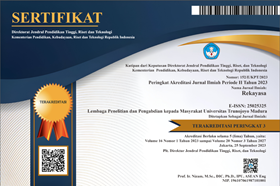Pengaruh Servant Leadership Terhadap Employee Affective Well-Being dengan Mediasi Personal Growth dan Perceived Organizational Support
Abstract
The role of a leader is very necessary, with the hope that employees can also be involved in dealing with company problems that are experiencing a decline in performance. This research aims to determine the influence of servant leadership on employee affective well being, both directly and indirectly through the mediation of personal growth and perceived organizational support. This research is a development of previous research conducted on service management. Respondents were taken using purposive sampling. Data collection was carried out by distributing questionnaires to 140 employees. The data analysis technique used is the Lisrel Structure Question Modeling (SEM) analysis technique. The research results show that servant leadership is directly related to employee affective well being. Apart from that, servant leadership can be related to employee affective well being, so it will be mediated using personal growth and perceived organizational support. It is hoped that the contribution in the research will provide insight into science in human resource management and can become a new reference for Medical Device companies.
Keywords
Full Text:
PDF (Bahasa Indonesia)References
Abid, G., Ahmed, S., Elahi, N. S., & Ilyas, S. (2020). Antecedents and mechanism of employee well-being for social sustainability: A sequential mediation. Sustainable Production and Consumption, 24, 79–89. https://doi.org/10.1016/j.spc.2020.06.011
Aboramadan, M. (2021). Servant leadership and followers’ creativity: does climate for creativity matter? Evidence-Based HRM, 9(1), 78–94. https://doi.org/10.1108/EBHRM-01-2020-0012
Ahmad, S., Sohal, A. S., & Wolfram Cox, J. (2020). Leading well is not enough: A new insight from the ethical leadership, workplace bullying and employee well-being relationships. European Business Review, 32(2), 159–180. https://doi.org/10.1108/EBR-08-2018-0149
Al-Ghazali, B. M., & Afsar, B. (2022). Impact of psychological capital on mental health, readiness for organizational change, and job insecurity: hotel employees’ perspective in COVID-19. Journal of Tourism Futures, 1–21. https://doi.org/10.1108/JTF-07-2020-0116
An Le, T. H., Trang Nguyen, T. M., Trinh, T. A., & Phuong Nguyen, T. H. (2020). Factors Affecting Quality of Working Life: A Study on Front-line Employees in Vietnamese Aviation Sector. IFAC-PapersOnLine, 56(C), 118–126. https://doi.org/10.1016/j.trpro.2021.09.014
Arampatzi, E., & Burger, M. (2020). Facility management services and employee well-being. Journal of Facilities Management, 18(2), 109–130. https://doi.org/10.1108/JFM-10-2019-0055
Baker, M. A., & Kim, K. (2020). Dealing with customer incivility: The effects of managerial support on employee psychological well-being and quality-of-life. International Journal of Hospitality Management, 87(March 2019), 102503. https://doi.org/10.1016/j.ijhm.2020.102503
Bunner, J., Prem, R., & Korunka, C. (2021). Perceived organizational support and perceived safety climate from the perspective of safety professionals: Testing reciprocal causality using a cross-lagged panel design. Journal of Safety Research, 78, 1–8. https://doi.org/10.1016/j.jsr.2021.06.006
Chen, H., & Eyoun, K. (2021). Do mindfulness and perceived organizational support work? Fear of COVID-19 on restaurant frontline employees’ job insecurity and emotional exhaustion. International Journal of Hospitality Management, 94(August 2020), 102850. https://doi.org/10.1016/j.ijhm.2020.102850
Chen, I. S. (2020). Turning home boredom during the outbreak of COVID-19 into thriving at home and career self-management: the role of online leisure crafting. International Journal of Contemporary Hospitality Management, 32(11), 3645–3663. https://doi.org/10.1108/IJCHM-06-2020-0580
González-Cruz, T. F., Botella-Carrubi, D., & Martínez-Fuentes, C. M. (2019). Supervisor leadership style, employee regulatory focus, and leadership performance: A perspectivism approach. Journal of Business Research, 101, 660–667. https://doi.org/10.1016/j.jbusres.2019.01.065
Griep, Y., Lukic, A., Kraak, J. M., Bohle, S. A. L., Jiang, L., Vander Elst, T., & De Witte, H. (2021). The chicken or the egg: The reciprocal relationship between job insecurity and mental health complaints. Journal of Business Research, 126, 170–186. https://doi.org/10.1016/j.jbusres.2020.12.045
Guo, M., Liu, S., Chu, F., Ye, L., & Zhang, Q. (2019). Supervisory and coworker support for safety: Buffers between job insecurity and safety performance of high-speed railway drivers in China. Safety Science, 117(April), 290–298. https://doi.org/10.1016/j.ssci.2019.04.017
Hair J, R, A., Babin B, & Black W. (2014). Multivariate Data Analysis.pdf. In Australia : Cengage: Vol. 7 edition (p. 758).
Mak, C., Snell, R. S., & Hong, J. (2020). A spiritual perspective on Senge’s five disciplines: harmony and Alibaba. Learning Organization, 27(6), 521–533. https://doi.org/10.1108/TLO-06-2020-0112
Matteson, M. L., Ming, Y., & Silva, D. E. (2021). The relationship between work conditions and perceptions of organizational justice among library employees. Library and Information Science Research, 43(2), 101093. https://doi.org/10.1016/j.lisr.2021.101093
Mcquade, K. E., Harrison, C., & Tarbert, H. (2021). Systematically reviewing servant leadership. European Business Review, 33(3), 465–490. https://doi.org/10.1108/EBR-08-2019-0162
Mehta, P. (2020). Fake it or make it: employee well-being in emotional work settings. Benchmarking, 28(6), 1909–1933. https://doi.org/10.1108/BIJ-07-2020-0377
Muñoz, R. M., Andrade, S. M., Peña, I., & Donate, M. J. (2022). Wellness programs in times of COVID-19, perceived organizational support and affective commitment: effects on employee innovative behavior. European Journal of Innovation Management, 26(7), 23–44. https://doi.org/10.1108/EJIM-02-2022-0072
Nauman, S., Zheng, C., & Naseer, S. (2020). Job insecurity and work–family conflict: A moderated mediation model of perceived organizational justice, emotional exhaustion and work withdrawal. International Journal of Conflict Management, 31(5), 729–751. https://doi.org/10.1108/IJCMA-09-2019-0159
Nazir, S., Shafi, A., Atif, M. M., Qun, W., & Abdullah, S. M. (2019). How organization justice and perceived organizational support facilitate employees’ innovative behavior at work. Employee Relations, 41(6), 1288–1311. https://doi.org/10.1108/ER-01-2017-0007
Neuhofer, B., Celuch, K., & To, T. L. (2020). Experience design and the dimensions of transformative festival experiences. International Journal of Contemporary Hospitality Management, 32(9), 2881–2901. https://doi.org/10.1108/IJCHM-01-2020-0008
Nunes, P. M., Proença, T., & Carozzo-Todaro, M. E. (2023). A systematic review on well-being and ill-being in working contexts: contributions of self-determination theory. Personnel Review. https://doi.org/10.1108/PR-11-2021-0812
Opoku, M. A., Choi, S. B., & Kang, S. W. (2019). Servant leadership and innovative behaviour: An empirical analysis of Ghana’s manufacturing sector. Sustainability (Switzerland), 11(22). https://doi.org/10.3390/su11226273
Ozturk, A., Karatepe, O. M., & Okumus, F. (2021). The effect of servant leadership on hotel employees’ behavioral consequences: Work engagement versus job satisfaction. International Journal of Hospitality Management, 97. https://doi.org/10.1016/j.ijhm.2021.102994
Pinna, R., De Simone, S., Cicotto, G., & Malik, A. (2020). Beyond organisational support: Exploring the supportive role of co-workers and supervisors in a multi-actor service ecosystem. Journal of Business Research, 121(February), 524–534. https://doi.org/10.1016/j.jbusres.2020.02.022
Preedy, S., Jones, P., Maas, G., & Duckett, H. (2020). Examining the perceived value of extracurricular enterprise activities in relation to entrepreneurial learning processes. Journal of Small Business and Enterprise Development, 27(7), 1085–1105. https://doi.org/10.1108/JSBED-12-2019-0408
Pritchard, A., Richardson, M., Sheffield, D., & McEwan, K. (2020). The Relationship Between Nature Connectedness and Eudaimonic Well-Being: A Meta-analysis. In Journal of Happiness Studies (Vol. 21, Issue 3, pp. 1145–1167). Springer. https://doi.org/10.1007/s10902-019-00118-6
Probst, T., Chizh, A., Hu, S., Jiang, L., & Austin, C. (2020). Explaining the relationship between job insecurity and creativity: A test of cognitive and affective mediators. Career Development International, 25(3), 247–270. https://doi.org/10.1108/CDI-04-2018-0118
Purohit, D., Jayswal, M., & Muduli, A. (2021). Factors influencing graduate job choice – a systematic literature review. European Journal of Training and Development, 45(4–5), 381–401. https://doi.org/10.1108/EJTD-06-2020-0101
Rich, G. J., & Sirikantraporn, S. (2020). Posttraumatic Growth and Resilience in Southeast Asia. Community, Environment and Disaster Risk Management, 21, 143–158. https://doi.org/10.1108/S2040-726220200000021009
Rinsky-Halivni, L., Hovav, B., Christiani, D. C., & Brammli-Greenberg, S. (2022). Aging workforce with reduced work capacity: From organizational challenges to successful accommodations sustaining productivity and well-being. Social Science and Medicine, 312(August), 115369. https://doi.org/10.1016/j.socscimed.2022.115369
Rofcanin, Y., Heras, M. Las, Bosch, M. J., Berber, A., Mughal, F., & Ozturk, M. (2021). Servant leadership and family supportiveness: Looking into employees’ work and family outcomes. Journal of Business Research, 128(February), 70–82. https://doi.org/10.1016/j.jbusres.2021.01.052
Rubel, M. R. B., Hung Kee, D. M., & Rimi, N. N. (2020). High-performance work practices and medical professionals’ work outcomes: the mediating effect of perceived organizational support. Journal of Advances in Management Research, 18(3), 368–391. https://doi.org/10.1108/JAMR-05-2020-0076
Ruiz-Palomino, P., & Zoghbi-Manrique-de-Lara, P. (2020). How and when servant leaders fuel creativity: The role of servant attitude and intrinsic motivation. International Journal of Hospitality Management, 89. https://doi.org/10.1016/j.ijhm.2020.102537
Ruiz-Palomino, P., Gutiérrez-Broncano, S., Jiménez-Estévez, P., & Hernandez-Perlines, F. (2021). CEO servant leadership and strategic service differentiation: The role of high-performance work systems and innovativeness. Tourism Management Perspectives, 40. https://doi.org/10.1016/j.tmp.2021.100891
Sharma, A., & Nambudiri, R. (2020). Work engagement, job crafting and innovativeness in the Indian IT industry. Personnel Review, 49(7), 1381–1397. https://doi.org/10.1108/PR-11-2019-0607
Sniatecki, J. L., Ashton, J. R., Perry, H. B., & Snell, L. H. (2021). Positive aspects of disability among college students. Journal of Research in Innovative Teaching & Learning, 14(2), 150–161. https://doi.org/10.1108/jrit-09-2019-0069
Son, Y. J., Lee, H., & Jang, S. J. (2022). Work stress and perceived organisational support on young Korean nurses’ care for COVID-19 patients. Collegian, 29(5), 748–754. https://doi.org/10.1016/j.colegn.2022.05.009
Son, Y., Lee, H., & Joo, S. (2020). Since January 2020 Elsevier has created a COVID-19 resource centre with free information in English and Mandarin on the novel coronavirus COVID- 19 . The COVID-19 resource centre is hosted on Elsevier Connect , the company ’ s public news and information . January.
Soomro, B. A., Mangi, S., & Shah, N. (2020). Strategic factors and significance of organizational innovation and organizational learning in organizational performance. European Journal of Innovation Management, 24(2), 481–506. https://doi.org/10.1108/EJIM-05-2019-0114
Zhang, X., Lin, Z., Liu, Y., Chen, X., & Liu, D. M. (2020). How do human resource management practices affect employee well-being? A mediated moderation model. Employee Relations, 42(4), 903–919. https://doi.org/10.1108/ER-08-2019-0320
Zia, M. Q., Naveed, M., Bashir, M. A., & Iqbal, A. (2022). The influence of servant leadership on employees’ outcomes via job embeddedness in hospitality industry. Journal of Hospitality and Tourism Insights, 5(3), 612–628. https://doi.org/10.1108/JHTI-01-2021-0003
Zitars, J., Spadafore, B., Coulombe, S., Riemer, M., Dreyer, B. C., & Whitney, S. (2021). Understanding the psycho-environmental potential functions of a green building to promote employee health, wellbeing and productivity: A theoretical perspective. Building and Environment, 205(August), 108268. https://doi.org/10.1016/j.buildenv.2021.108268
DOI
https://doi.org/10.21107/rekayasa.v17i2.27171Metrics
Refbacks
- There are currently no refbacks.
Copyright (c) 2024 Muhammad Dimas Prabowo, Sukmo Hadi Nugroho

This work is licensed under a Creative Commons Attribution-ShareAlike 4.0 International License.
























